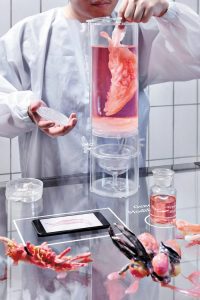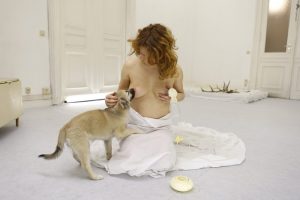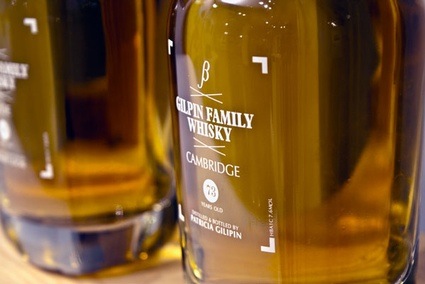
Millions of people around the world are type 1 diabetics. Most of them are otherwise healthy, and enjoy a perfectly normal life if they are disciplined enough to keep their blood sugar level constantly under check.
James Gilpin, who recently graduated from Design Interactions in London, suffers from type 1 diabetes. He has used his own experience of the condition to explore but also discuss the consequences of using science to alter our bodies’ abilities.
The designer’s project, Family Whisky, is inspired by the fact that large amounts of sugar are excreted on a daily basis by diabetic patients -especially older people- who don’t have adequate control of their sugar levels. Processing old people’s urine to produce whisky of high economic value is not a scheme sponsored by the government to solve Britain’s looming pension crisis, it is the starting point for a discussion with health care professionals about the everyday problems caused by diabetes.
Is it plausible to suggest that we start utilizing our water purification systems in order to harvest the biological resources that our elderly already process in abundance? In James Gilpin’s scenario, sugar heavy urine excreted by patients with diabetes would be used for the fermentation of high-end single malt whisky for export.
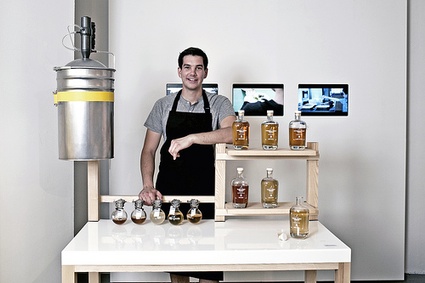
James had lined up bottles of various whisky blends for visitors to taste during the Design Interactions show (which closed in late June i’m afraid). Although the liquid smelled nothing like urine, I wasn’t as brave as other people and refuse to drink any of it.
I caught up with James last week to ask him a few questions about his project:
How did you approach the diabetic patients and ask them for their urine? How did they react to your request?
I began by working with people that I know personally so my grandmother was the first candidate to sign up for the trials. I went through lots of my process with her and worked out where people were likely to feel uncomfortable. This helped to avoid lots of awkward moments. (I should say that not all my collaborators were diabetic some just had dilapidated endochrine systems due to old age.) I then heard a story about a pharmaceutical factory based in a community of elderly people and they would send representatives door to door exchanging cushions and soft toys for tubs of urine. The factory would then take the urine and process it to remove all of the chemicals that they had originally been selling their customers on the shelves of pharmacies. I took this model and adapted it for my own purpose. The only problem was that people then mistook me for an innovation designer and the project would be misunderstood. I am of course not suggesting that this process should be in anyway commercial although the idea of old peoples homes with distilleries in the garden in a funny one.
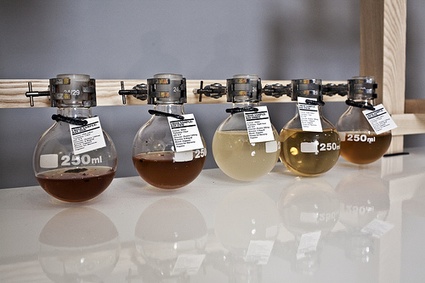 Can you describe the process of turning urine into whisky? Did you do it yourself or did you just bring the ‘ingredients’ to a brewery?
Can you describe the process of turning urine into whisky? Did you do it yourself or did you just bring the ‘ingredients’ to a brewery?
So the urine is cleaned using the same techniques that we use for purifying our mains water stock. This process itself shares much of the distillery process. The thing that made life easier is that the sugar molecules are large and will form crystals which can then be removed and purified separately.
This sugar is added to the mash stock and used to accelerate the fermentation process. This is sort of a bit of a cheat as traditionally the sugars would be made form the starches in the mash. During the brewing process I make a clear alcohol sprit. This is again not the traditional method for making whisky but I adopted a commercial technique for cheap whisky and used whisky blends which I added to the sprite to give color, taste and viscosity.
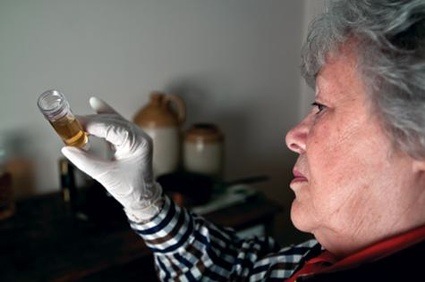 Could people do it themselves with the kind of household equipment they already have home?
Could people do it themselves with the kind of household equipment they already have home?
You can make the alcohol at home but purifying the sugars requires far more understanding of clean lab processes and chemistry so I definitely wouldn’t recommend doing this at home. Distillery equipment can be bought legally but you will need a licence to actually produce alcohol.
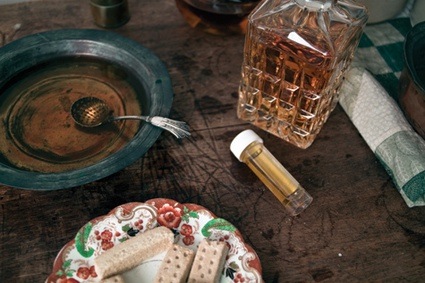 Home distillation equipment
Home distillation equipment
Can the diabetic safely drink the whisky?
This is one of the reasons I choose whisky as an output. No, diabetics definitely shouldn’t drink whisky and it’s not a product intended to be consumed by diabetics only produced by them. That being said if you read the online diabetic forums you will find it is often the drink of choice as whisky will give you an artificial low in sugar levels shortly after drinking it. This is not because its is forming some biochemical miracle, it is simply that the high alcohol quantities mean that the sugar cannot be processed at the same time.
The fact that I am associating alcohol with a severe medical condition has upset some medical professionals that I have met during the process of my project. This was a very deliberate provocation on my part as I wanted to have a dialogue with health care professionals about the real complications of living with diabetes. People still want to drink, eat unhealthy food and experience the messiness of everyday life. In my personal experience this is often overlooked by professionals who can give the impression that theses things simply should not be a part of life as a diabetic patient but they are. I am interested in finding ways in which designed systems can help overcome these very social problems.
Are you planning to show Family Whisky in other contexts than the RCA show?
The piece was designed as a public engagement piece that would exist outside the gallery context and act as an educational tool. That said the next two venues of the Whisky shop are in a gallery context. I am showing at 100% materials in September and at the AND festival (Abandon Normal Devices) in Manchester in October. This is a festival organised by FACT and curated by Professor Andy Miah.
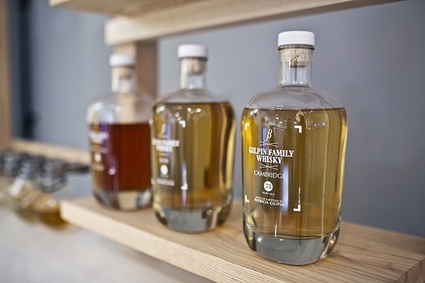 What do you hope that your project can teach to someone who has no experience of diabete?
What do you hope that your project can teach to someone who has no experience of diabete?
I show a film trilogy at the same time as serving whisky and these each of these outline one aspect of living with diabetes. I had originally hoped to show people that although Diabetes is a medical condition it could be possible to consider this break from our genetic norms as a state of enhancement and not just an illness in need of constant attention.
Thanks James!
All images courtesy of James Gilpin.

